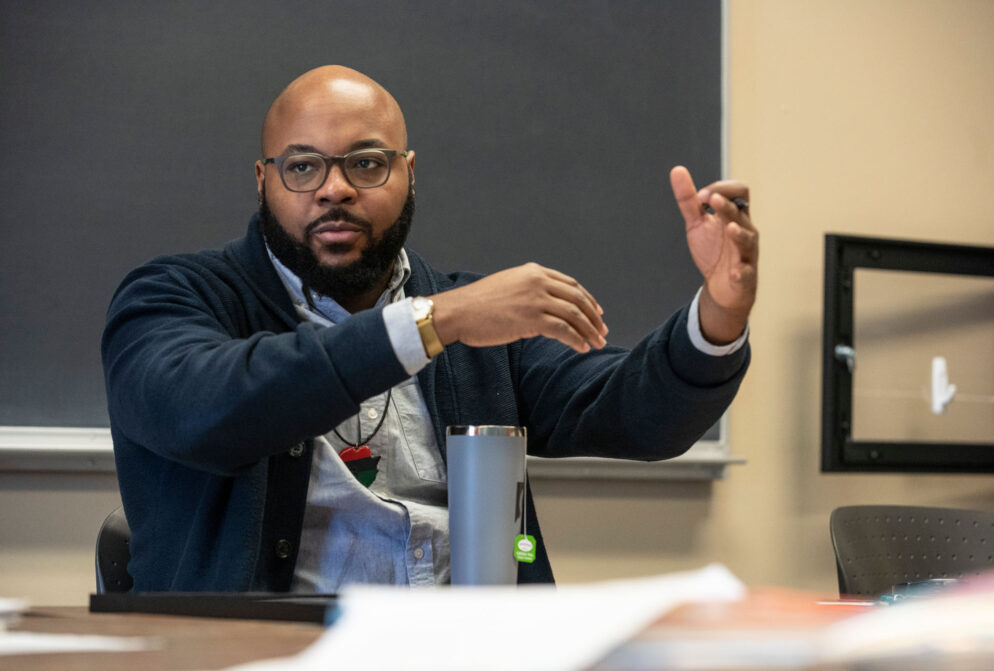Chicago Public Library Award, “Finna,” and More
Assistant Professor of English, poet, and spoken word artist Nate Marshall has not allowed the circumstances posed by the pandemic to decelerate his exciting momentum. In one year, Marshall published his anthology “Finna,” named one of the best books of 2020 by NPR; was awarded the 21st Century Award from the Chicago Public Library; and — thanks to the pandemic — adapted his unique teaching style to remote learning.
“Finna” explores the current era of reinvigorated white supremacy by examining the brevity and disposability of Black lives and other oppressed people. Through lyrical poems that celebrate the Black vernacular, Marshall widens notions of linguistic and social possibility as he considers the violence inherent to gendered language and the propensity to erase certain peoples from the American narrative.
In addition to receiving the 21st Century Award and publishing “Finna,” the English professor has also managed to convert his captivating teaching style to the online learning sphere, where he mentors students while simultaneously regarding them as fellow artists. He imbues his teaching with the idea that students have the ultimate power over their poems — that they are the story.
Because poetry students look toward their powers of observation and their own identities for material, their message often intersects with the racial and social unrest that has taken place over the last year.
“Classroom discussion has reflected upon the climate of white supremacy that has been particularly pronounced over the last year. I think many of these issues are new to students or at least students perhaps feel an urgency around these issues that is new,” says Marshall. “It’s been interesting to observe and to engage with, and in many ways it has been rewarding to offer students some frameworks to consider these issues. The reality of my experience is that structural and interpersonal racism has been foundational to my understanding of the world and so these issues of white grievance or police violence or broad inequality are things I’ve been thinking about since childhood.”
Marshall works to encourage student engagement by taking advantage of the online aspect of current classes; he takes classes on virtual field trips at other institutions and has featured class visitors who “would otherwise be too difficult to pull off.” His continuing love for the written word and for teaching writing permeate the classroom atmosphere, even through Zoom, and will continue to inspire students this semester as he teaches Introduction to Creative Writing with Visiting Assistant Professor of English Alison C. Rollins, who last year served as the lead teaching and learning librarian in Tutt Library, and who also previously taught the Advanced Poetry Workshop course.
Marshall’s passion for teaching poetry stems from his ardent belief in the potential inherent in the art of young people. When asked about the overall impact on poetry of Amanda Gorman’s widely acclaimed poem read at President Joe Biden’s inauguration, he says, “I think when we have an inaugural poet — Gorman is only the sixth — it represents a kind of stage for poetry in U.S. life that’s rare. I’m not sure that will have a long-term impact on society, but I think it contributes to a chorus that makes the case for the value of art and specifically the value of investing in young people’s involvement in the arts and in poetry specifically. Amanda Gorman is one of thousands of young people in the U.S. and beyond who have been shaped and impacted by the transformative power of youth poetry programming. A few years ago, I was also one of those young people.”
Marshall therefore views Gorman’s inaugural poem as not an outlier but as one notable piece of art in a never-ending stream of creation that emanates from young people in America.
“We’ve been in a moment for the last many years where poetry has been attracting more attention — I’m thinking of Warsan Shire’s featuring in the Beyonce short film “Lemonade,” for example. Shire, like Gorman, was someone who came to poetry as a young person. I’m not sure if the interest will last but I think more people are reading poetry these days and I think that’s a good thing.”
While Marshall does not believe that “The Hill We Climb” will incite more students’ interest in poetry in the long run, he hopes that it will “attract resources to the programs that make pathways for young people like Amanda.”
